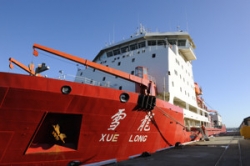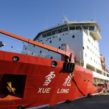
The Arctic: A Future Source of Russo-Chinese Discord?
Publication: China Brief Volume: 10 Issue: 24
By:

Since 2007, in large part due to aggressive Russian posturing, the Arctic region has become a bone of contention among members of the Arctic Council as well as a subject of international concern. While the signing of the Russo-Norwegian treaty on September 15 put an end to disputes over seabed and maritime borders between two claimants of the region, the Arctic issue has seen the emergence of a critical Asian dimension as it becomes the source of cooperation as well as simmering tension between Russia and China [1].
Background
Climate change and technological developments are opening up the Arctic region for more year-round navigation through the Northwest Passage and even straight across the North Pole, which make the provision of energy from the Arctic to Asia a matter not just of energy policy but of security policy for Russia. Thus, the security of Arctic energy matters to both Russian and Asian policy. The shortest route for maritime transport between Europe and Asia may then transit via the Barents Sea, reducing the distance between Western Europe and Asia by over 7,400 kilometers, and potentially making China a key player (due to its shipping industry and dependence on foreign energy) in the Arctic (See "China and the Arctic: The Awakening Snow Dragon," China Brief, March 18, 2009) [2].
According to a Chinese press report, “Russia hopes to make the Arctic route a competitor to the Suez Canal and increase cargo traffic along its Siberian coast from two million tons a year now to 30 million tons annually” (China Daily, August 26). Leopold Lobkovskiy, deputy director for geology at the Institute of Oceanology of the Russian Academy of Sciences, claimed that Russia discovered reserves of hydrocarbons in the Arctic comprising 51 billion tons of oil and 87,000 billion cubic meters (BCM) of natural gas, making it the third largest reserve in the world after the Persian Gulf and Western Siberia. Consequently, Moscow intends to sharply raise hydrocarbon supplies along the Northern Sea Route in 2011 and its officials say that the value of mineral resources in the Arctic exceeds $30,000 billion (ITAR-TASS, September 22).
Finally, according to Deputy Prime Minister Sergei Ivanov, the Arctic’s development “is directly linked to solutions to long-term political, economic, defense, and social problems of the state and will ensure our [Russia’s] country’s competitiveness on global markets” (ITAR-TASS, October 2; October 6). “Two-thirds of the estimated wealth of the Arctic’s resources lie in Russian territory and the region produces about 15 percent of Russia’s GDP and about a quarter of its exports,” said Ivanov (ITAR-TASS, October 2). Moscow appears to be accelerating its plans to explore the Arctic region (e.g. beginning design work on Arctic carriers for transport of liquefied natural gas [LNG]) (Interfax, August 31; September 9; Eyjam, September 23; Reuters, September 28), and enhancing its overall capabilities for conducting Arctic explorations in the near term as the routes become more accessible. Indeed, Moscow intends to boost its LNG exports to 10 percent of its total export deliveries by 2020 in order to exploit this new trend in gas exports (Interfax, September 17).
Cooperation
Given the Arctic’s centrality to Moscow’s vital interests and Russia’s lack of capital to develop this high-cost region, it has been inviting all polar countries to develop a mutually acceptable regime of exploration and exploitation of Arctic resources (Interfax, September 17). Reportedly in May of this year, China was among the countries invited for this joint exploration with Russia. Rosneft, Russia’s top oil producer, and China National Petroleum Corporation are reportedly looking into joint exploration of Russia’s Arctic offshore hydrocarbon deposits, Russia’s top energy official said on November 24 (Reuters, November 24).
Officials in the Russian North and Northeast invited China to explore and exploit local resources. For instance, the governor of the Yamalo-Nenets Autonomous region, Dmitry Kobylkin, reportedly expressed interest in forming a partnership with the Chinese in oil and gas development. The Yamalo-Nenets Autonomous region accounts for more than 90 percent of the natural gas production and around 12 percent of the oil production in Russia. Kobylkin made this statement while attending the World Expo 2010 Exhibition in Shanghai. Kobylkin also said he was ready to offer partners in China a "mutually advantageous and constructive cooperation" in the regional natural resources sector. Furthermore, "We are ready to act as intermediaries between an investor country and the oil and gas sector and create a good investment climate," said Kobylkin (UPI, May 3).
Chinese Interests in the Arctic
Stimulated by the lure of these resources, China has begun to advance its interests in the region. Not only do these interests consist of a very strong polar research capability, China’s dependence on exports and greatly increased shipbuilding capabilities naturally had lead it to examine closely the prospects or greater exploitation of the Northern Sea Route and the commercial possibilities along its length. According to Chinese experts, the melting Arctic region’s huge untapped resources and potential for shorter transportation routes figure high on the radar screen of Chinese global strategy (Maritimemag.com, November 18).
Since China is also flush with capital, a SIPRI report noted that,
Another potential multilateral joint venture in which China’s capital could be used in exchange for the opportunity to gain the experience it seeks in deep-water drilling projects is the ongoing cooperation between Statoil, Total and Gazprom to develop the first phase of the Shtokman gas fields in the Barents Sea. This is regarded not only as a huge commercial opportunity but also a formidable technological challenge [3].
In particular, China could invest in Russia’s Arctic energy projects that require huge foreign investments if they are to materialize, thus giving it a major stake in this critical Russian region and energy sector [4].
Accordingly, China has publicly stated its interests in the Arctic and demands that they be taken into account. Chinese Assistant Minister of Foreign Affairs Hu Zhengyue, outlined China’s overall Arctic agenda while attending an Arctic forum organized by the Norwegian Government on Svalbard in June 2009. The assistant foreign minister said, “When determining the delimitation of outer continental shelves, the Arctic states need to not only properly handle relationships among themselves, but must also consider the relationship between the outer continental shelf and the international submarine area that is the common human heritage, to ensure a balance of coastal countries’ interests and the common interests of the international community” [5].
Guo Peiqing, associate professor of polar politics and law at the Ocean University of China, put it more directly: “Circumpolar nations have to understand that Arctic affairs are not only regional issues but also international ones.” Guo estimated that about 88 percent of the seabed of the Arctic Ocean would be under the control of the Arctic littoral states if the Commission on the Limits of the Continental Shelf were to approve all the existing or expected claims to the Arctic Ocean continental shelf [6]. Furthermore, Mr. Guo claimed that the Arctic could become "a new energy corridor that would be safer than the Indian Ocean where piracy is such a plague on the world’s shippers, including China" (Maritimemag.com, November 18).
These statements imply that China, though not a member of the Arctic Council, may dispute any claims of sovereignty in the Arctic waters beyond littoral countries’ 12 mile limit or economic exclusion zone if it signed the UN Convention on the Law of the Sea (UNCLOS).
While Arctic problems and issues, as China knows and admits, have hitherto been resolved by peaceful means like the Russo-Norwegian treaty, China is noticeably wary of Russia’s intentions in the Arctic.
According to the well-sourced SIPRI report:
Chinese observers have made note of Russia’s decision in August 2007 to resume long-distance bomber flights over the Arctic and the planting of a Russian flag on the Arctic seabed that same month. Guo [Peiping] has said that the disputes in the Arctic are in fact ‘Russia and some other states’ challenge to the international order and international law after the end of the cold war.’ China and the rest of the world would be at a disadvantage if Russia’s claims over the underwater terrain between the Lomonosov and Mendeleev ridges are legitimized because, in that case, Russia alone would have rights to the resources in that area. Even if that claim is unsuccessful, some Chinese Arctic specialists have expressed concern that the commercial advantage of the Arctic routes would substantially decrease if Russia were to unilaterally charge exorbitant service fees for ships passing through its EEZ waters [7].
Yet, the signs of Chinese interest in the area have also clearly worried the Russian leadership despite the endless protestations that Russo-Chinese relations are at their peak and that an identity of interests exists between the two states. Admiral Vladimir Vysotsky, commander in chief of the Russian Navy—probably speaking with authorization from above—stated that,
There are a lot of people who wish to get into the Arctic and Antarctic from an economic point of view. — We have already been observing how a number of states, which are not members of the Arctic Council, are setting out their interests quite intensively and in various ways. In particular, China has already signed agreements with Norway to explore the Arctic zone. We know about the economy and infrastructure that exist in China today, which is becoming our serious partner from both positive and problematical sides. — Therefore Russia needs to form its rational position and, at the same time, not give up any of its interests. – There are not long-standing relationships, overt opponents, or overt allies in the Arctic yet. But I believe the most problematic relations will be with those countries which are not traditional members of the Arctic Council (ITAR-TASS, October 4).
Given the strategic importance Russia attaches to the Arctic and the fact that it already serves as a maritime “highway” for shipping oil to Japan and China, Russia has steadily augmented the defense element in its approach to the Arctic (Kyodo News, September 2; Oil & Gas Journal, March 22). Admiral Vysotsky also highlighted the increase in naval, air, and submarine capabilities that will be assigned to the region, which will heighten concerns in the area (RIA Novosti, October 1; October 2). Thus, the Arctic region, like arms sales issues, may become a future source of tension between Moscow and Beijing. Furthermore, the Russian military, perhaps with official support, appears to be no longer shy about singling out China as a possible future competitor. This is a development that bears watching.
Notes:
1. Moscow, Ministry of Foreign Affairs of the Russian Federation, www.mid.ru in Russian, September 30, 2010, Weekly Foreign Ministry Briefing.”
2. Espen Barth Eide, “The Return of Geopolitics and Energy Security,” Rose Gottemoeller and Rolf Tamnes, Eds., High North: High Stakes: Security, Energy, Transport, and Environment, Bergen, Norway: Fagbokforlaget, 2008: 42-43.
3. Linda Jakobson, “China Prepares For an Ice-free Arctic,” SIPRI Institute (Stockholm International Peace Research Institute), SIPRI Insights on Peace and Security no. 2010/2, 2010: 9.
4. Ibid.
5. China’s perspective on Arctic matters, Shijie Zhishi, vol. 55, no. 15 (2009). Quoted in Jakobson, 9.
6. Guo Peiqing, Associate Professor, Ocean University of China, Interview with the author, Qingdao, 25 June 2009, Quoted in Ibid., 10.
7. Ibid., 12.





